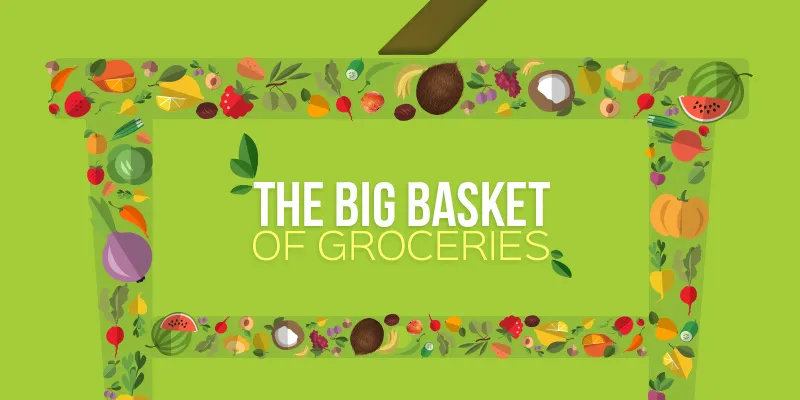Bigbasket builds on B2B business with automation technology for kiranas
With Bigbasket as the sole supplier with automated replenishment of inventory, retailers will not have to engage with different points for supply, payments etc., anymore.

Who would have thought that the humble kirana would have such a big role to play in the Indian e-commerce growth story? Kiranas are becoming a significant part of e-commerce in the country, and in multiple ways. Flipkart had tied up with them long ago for faster delivery, as had Amazon with bigger outlets for ‘Amazon Now’. Online grocery market leader Bigbasket also tied up with more than 1,000 retail stores to sell their private label products.
In a new effort to build their business-to-business (B2B) commerce, Bigbasket is entering into a partnership with Snapbizz, a cloud-based retail technology company that serves 2,000 retailers (across all Tier I cities). The effort is aimed at automating supply chain and inventory management processes so that retailers get their stocks replenished by Bigbasket automatically.
A serious effort
The collaboration between Bigbasket and SnapBizz started a year ago. The tech company enabled its partner retailers to manually connect to Bigbasket through their specialised app. However, since August 2016, efforts have been on to automate the ordering system (without an app). The implementation is done with, and all the 2000 retailers can now avail this service.

Abhinay Choudhari, Co-founder and Head of New Initiatives, Bigbasket, told YourStory, “Our alliance with Snapbizz will enable our partner kirana stores to efficiently manage their sourcing and inventory… Bigbasket’s large scale sourcing of commodities, staples, fruits and vegetables and FMCG products, and the wide assortment of products will act as a single source of supply for kiranas.”
Using Snapbizz’s predictive analysis tools, orders can be regenerated multiple times in a week by the retailer, which will promptly be fulfilled by Bigbasket. Every time an item is scanned at SnapBizz’s PoS machine at the kirana, the inventory comes down, and it will be recorded in real time. Once it hits the average 'minimum base quantity' (MBQ, which the retailer keeps at the store), the frequency of ordering will change.
Prem Kumar, Founder and CEO, SnapBizz, said, “In the current day scenario, where customers are migrating to modern trade for better services, offers and savings, we are committed to showcasing the strength of our kirana stores and driving traffic back to them. Through smart merchandising and promotion, direct revenue generation opportunities from brands, smart inventory management to enhance profitability and targeted customer engagement tools, Snapbizz aims to transform the kirana store into a smart modern store.”
Solving a problem for kiranas
Kiranas deal not with brands but with suppliers/distributors. They have to engage with 80-100 distributors for supply, and it, therefore, takes a lot of time and investment. But SnapBizz-BigBasket partnership will change this –and retailers will not have to engage with different points for supply, payments etc., anymore.

Usually kiranas’ working capital is available for 10-15 days. But Chirantan Bhabhra, Director- Marketing and Sales, SnapBizz, claimed that with their technology, working capital investment can be reduced by 50-60 percent.
He explained: “Bigbasket has the supply side sorted. Instead of having a 15-day share, the retailer can order from them multiple times a week. Then there is shelf space; if seven shampoos are sold, that space can be utilised, which means assortment can increase. They can buy a lot more products.”
Generally, when the retailer goes out to get the supply, he would want to maximise the load so as to optimise the working capital. But SnapBizz' technology enables them to order daily; so there is no need to block the capital.
Based on the kirana’s average daily sales, the system understands how much stock the kirana should keep. Bigbasket has integrated SnapBizz PoS with its backend. The PoS machine at kirana generates auto purchase order. Bigbasket will service it, even if it is just one SKU.
In the long run, Chirantan added, this helps the kiranas gain a level playing field with modern retail. (The kirana has to spend close to Rs.40,000 for the machine.)
Multiple benefits
Brands are also benefited with this technology. Chirantan said, “Every time an item is scanned, we get to know what is being sold. That generates a lot of analytics about what is being bought and where. Usually, brands sell to distributors who sell to retailers; they can’t otherwise find out their sales in each city, location, retailer etc. With us, they can. They can also find out what their competitors are selling.” SnapBizz aims to cover 10,000 kiranas this year.
E-commerce players’ love affair with kiranas has multiple reasons behind it. Kiranas are closer to the consumer, hence enable quicker delivery. Also, in Bigbasket’s case, the wide network of kiranas acts as effective selling points for their private label. More importantly, kiranas add volume to the purchases.
Abhinay explained: “When you are doing B2C commerce, only end consumers are buying from you. But when the retailers buy whatever they are selling from you, the sales volume goes up for us. The more you buy from the manufacturers, the more margins you get.”
Bigbasket aims to achieve a Rs 1,000-crore exit rate by the end of FY2018. The scaling up B2B business will surely have a major impact on those plans.







